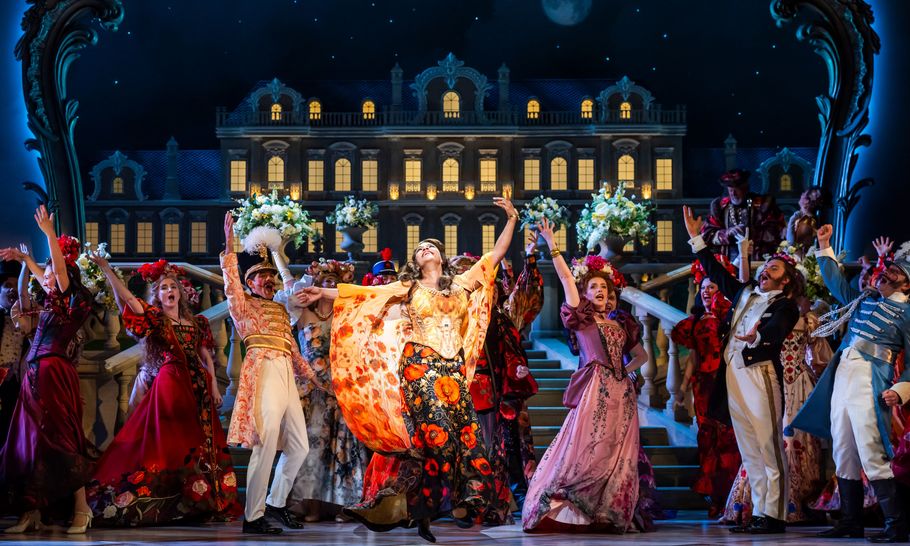
by MARK RONAN

What a delight! This Merry Widow at Glyndebourne was beautifully staged, with plenty of laughs. It’s a new production whose director Cal McCrystal says, “I’m not interested in doing things where there aren’t laughs” — and he has certainly succeeded. Set in its own time, the early 20th century, when wealthy widows could enjoy an independent status without the restrictions that befell other women, it portrays a Viennese society that was publicly polite but privately licentious.
Yet despite a devil-may-care attitude of the characters, loyalty lies at the heart of Franz Lehar’s Widow. Hanna Glawari (the merry widow whose husband has left her a fabulous fortune) may flirt with Camille, the Comte de Rosillon, who is in love with Valencienne, wife of Baron Zeta, but nothing really untoward occurs. Indeed her heart belongs to her earlier lover, the independently wealthy Count Danilo Danilovitsch, who professes not to give a damn whom she chooses as a husband. He merely regrets it cannot be him because otherwise everyone will say he married for the money.
This all takes place in Paris, the epicentre of style and romance, though both Danilo and Hanna (she from a humble background) hail from a small tax haven in the Balkans whose ambassador in Paris is Baron Zeta. He is deeply concerned in the intrigue surrounding whom Hanna will marry, because if she moves her substantial assets out of the country interest rates will skyrocket and the economy will collapse. Unfortunately the Frenchman, Camille, seems to be the leading contender for Hanna’s hand, and she invites everyone to their engagement party.
Danilo is consumed by jealousy, but attends the party where everyone is entertained by his favourite dancers, the Grisettes, now joined by a new member — who turns out to be Hanna in disguise. Despite reproaching her for this trick, yet swept up by the music of waltz, he finally admits he loves her. When Hanna reveals that were she to marry again, neither she nor her future husband would inherit the Glawari fortune, he can now marry her without dishonour — a happy ending to a charming operetta. Glyndebourne is the perfect place for such things, and the engaging designs by Gary McCann help create the atmosphere of a genteel musical — which is what this is.
The audience took a while to warm up, but by Act II, as the guests enter for the ball, their engagement was palpable, and there was even clapping along with the music. This was very much inspired by Tom Edden as Njegus, the Baron’s factotum, who encouraged the audience to call for encores of popular numbers. The German libretto has been converted to English by Stephen Plaice with up to date references that caused the audience to laugh out loud.
Excellent choreography by Carrie-Anne Ingrouille, and even the wonderful Thomas Allen joined in the dancing. Now in his eightieth year, Sir Thomas made a consummate Baron Zeta, with Soraya Mafi as his much younger wife Valencienne. This super cast, with Michael McDermott as the Comte de Rosillon (a notable stage presence), was headed by the wonderful performance of Danielle de Niese as Hanna, well matched by Mexican baritone Germán Olivera as Danilo. Production and singers besides, John Wilson and the London Philharmonic gave a wonderfully musical performance. He began with excellent bounce, and continued with sounds and rhythms that ravished the ear. It all came over with huge clarity and did what opera should always strive to do, entertain its audience even as it challenges them to an emotional understanding.

Leave a Reply